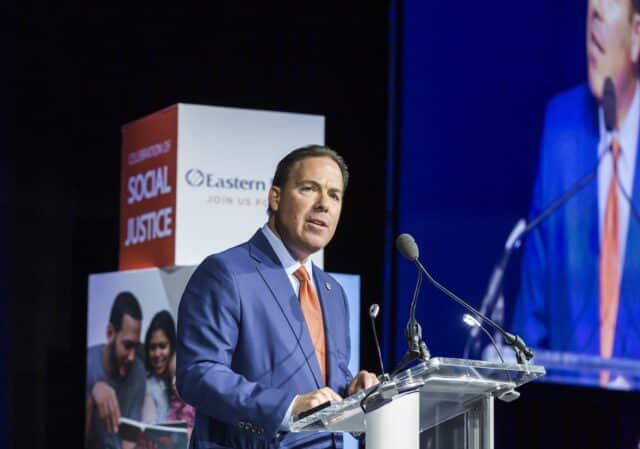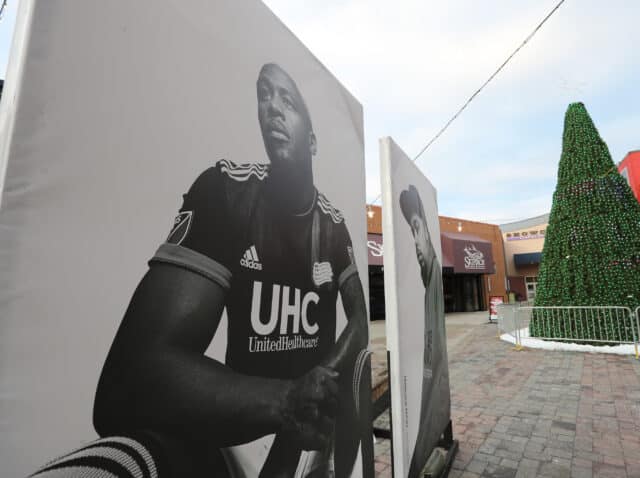
Some banks and other companies are going beyond familiar ways of helping their communities, like volunteer days and monetary donations, with big projects that aim for bigger impacts.
Two Boston-area banks are stepping outside longstanding industry traditions of donating to local organizations and volunteering for community causes with major philanthropy initiatives that could have long-term impacts on Massachusetts’ economy.
Eastern Bank this year pledged $1 million to support early childhood development, with half that money going toward an organization trying to change how parents, caregivers and communities interact with young children. It’s an attempt to head off racial and economic disparities that show up later in life when these children fall behind their better-off peers in school and enter the workforce with far fewer skills and opportunities.
Supporting an entirely different segment of the population could have economic impacts for some city neighborhoods. Bank of America’s Massachusetts operations this year sponsored a documentary photo exhibit to raise awareness for Boston Uncornered, an initiative of College Bound Dorchester that educates, mentors and financially supports gang members to help them leave the streets behind.
“We are really fortunate to have launched this solution here in Boston,” said Mark Culliton, College Bound Dorchester’s founder and CEO. “Because we do have an active, engaged and committed corporate sector that is also not afraid of things that are counterintuitive … and not afraid of investing in really disruptive technology or, in our case, social change.”
Causes That Make a Difference
While contributing to organizations in the communities where it has branches, Boston-based Eastern Bank every year selects an issue for additional focus. The foundation is focusing on early childhood development this year and into 2020.
“We look at what’s going on in the region,” said Nancy Huntington Stager, president and CEO of the Eastern Bank Charitable Foundation. “We pick
causes we think will make a difference.”
Less than 1 percent of philanthropic giving goes toward early childhood development, Huntington Stager said.
“The voice of business has been quiet on this topic for too long,” she said. “As with any of these social justice issues, when you start to peel it back, there is so much need.”

Eastern Bank Chair and CEO Bob Rivers speaks at a 2019 event celebrating the bank’s social justice work. The bank gave $500,000 to The Basics, an initiative trying to help improve parenting and caregiving statewide. Photo courtesy of Eastern Bank | Marilyn Humphries
Of the $1 million pledged to support nonprofits working in this area, $500,000 was given to The Basics. Founded four years ago by Ronald Ferguson of Harvard University’s Kennedy School, The Basics engages parents, caregivers and community members – anyone from physicians to librarians, ministers and barbers – to change how they interact with children.
“There’s a ton of really important brain development that happens in early life,” Ferguson said.
The Basics, which has been rolled out in about 35 communities, offers pillars to guide adults in how they interact with children. Since it is relatively new, Ferguson said the organization continues to gather data, feedback and ideas for improving the tools.
Early Childhood Crucial
Focusing on the early years of a child’s life could have short- and long-term effects on families and the larger economy.
Studies have shown that children who are not developmentally ready for kindergarten often fall behind in school – and that often these children are from poor families, many of them families of color. This eventually affects their preparedness for entering the workforce and contributing to society, Huntington Stager said.
She added that the current workforce is also affected, because of the toll childcare stress can have on families.
The bank also gave $10,000 grants to 50 organizations in Massachusetts, New Hampshire and Rhode Island involved with helping children, engaging parents and providing development opportunities for professionals working in early childhood development. Among the organizations were the Beverly Children’s Learning Center, Horizons for Homeless Children in Roxbury, Families First Parenting Programs in Watertown and Acre Family Child Care in Lowell.
The Bank that Helps Gang Members
Just as The Basics is trying to change how communities interact with children, Boston Uncornered wants to transform how neighborhoods deal with gang members.
Visitors to Gillette Stadium during the first two weeks of December or the Boston Common over the summer got to see the Uncornered Photo Documentary Project, an art exhibit sponsored by Bank of America featuring 8-foot-tall photos of community members and powerful local figures taken by John Huet.

Former New England Revolution player Claude Dielna is pictured as part of Boston Uncornered’s photo exhibition at Patriot Place, sponsored by Bank of America. Photo courtesy of Bank of America.
Miceal Chamberlain, Massachusetts market president at the bank, did more than support the exhibit. He was one of the people featured in a portrait.
College Bound Dorchester was selected as one of two Massachusetts nonprofits in 2016 to receive a two-year, $200,000 grant from Bank of America’s Neighborhood Builders program. Chamberlain said the program focuses on organizations that focus on issues like economic mobility, workforce development and building stronger communities. As part of the Foxborough exhibition the bank sponsored, the New England Patriots also donated $90,000 to the program.
The Boston Uncornered initiative hires former gang members to connect with a neighborhood’s most powerful and influential people – current gang members often found hanging around on street corners. The initiative provides stipends to help the current gang members finish high school and go to college, turning them into productive members of the community.
An Unconventional Choice
Chamberlain, also who volunteers with College Bound Dorchester, said the made an unconventional choice to work with Uncornered because of these educational stipends for gang members, some of whom were once imprisoned.
“We think in the long run that strategy has shown and proven that it’s saving the commonwealth money from not having the issue of recidivism with this affected population, and it also is a big way to get this population educated and off the streets,” Chamberlain said. “It’s another way of accomplishing an end result that our company is very focused on.”
“We are really fortunate to have launched this solution here in Boston, because we do have an active, engaged and committed corporate sector that is also not afraid of things that are counterintuitive and not afraid of investing in really disruptive technology or, in our case, social change.”
— Mark Culliton, founder and CEO, College Bound Dorchester
Culliton, CEO of College Bound Dorchester, said the documentary photo project, which also included former gang members among its subjects, helped show the universality of people whose life experiences leave them feeling trapped and cornered. Chamberlain as a child survived a fire that killed his brother.

Diane McLauglin
“The photo project was a chance to highlight the one and the sameness of these individuals in an arresting way to challenge our own mindsets while telling a story about everybody having an experience of being cornered or stuck,” Culliton said.
College Bound Dorchester works with several banks, and Culliton pointed to Chamberlain and Bob Rivers, Eastern Bank’s chairman and CEO, as skilled mangers with “incredible humility and curiosity that allows them to be connected to those who aren’t in traditional seats of power.”
“I do think that leadership matters and has a meaningful and powerful impact on those us out here in the neighborhoods doing the work,” Culliton said. “The leaders walking the walk matters and makes a difference.”
Correction: An earlier version of this story misstated the name of Bank of America’s Massachusetts market president. His name is Miceal Chamberlain.




 |
| 